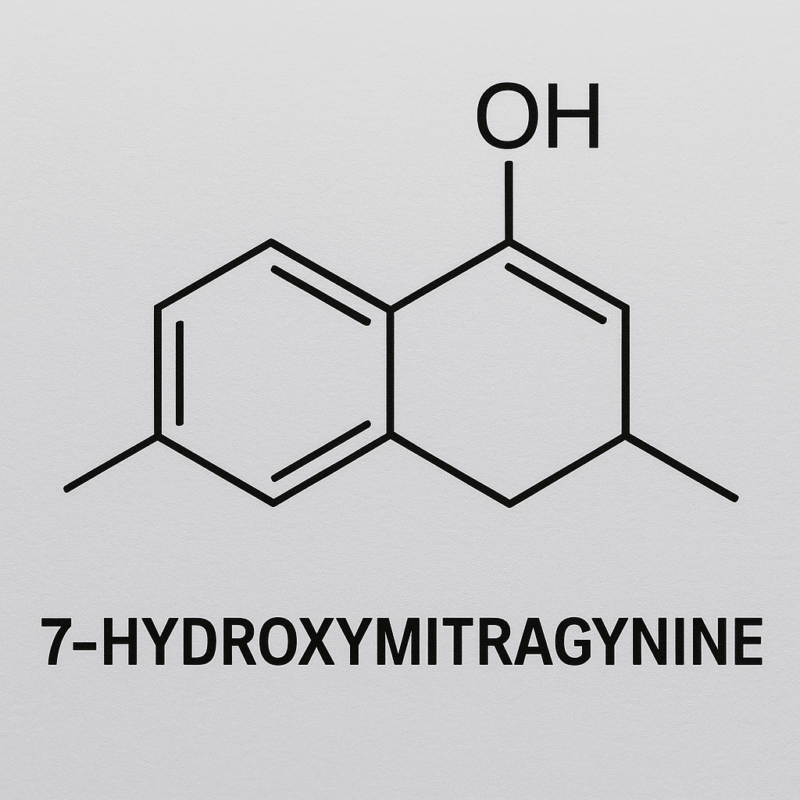7-Hydroxymitragynine is kratom’s most scrutinized alkaloid—discover its safety, regulations, and why vendor transparency matters.

Introduction
Kratom has become a global conversation topic in 2025. While consumers often focus on different strains like green vein, white vein, or red vein, regulators and scientists are paying close attention to a single compound: 7-hydroxymitragynine (7-OH). This alkaloid is one of the most potent naturally occurring components of kratom, and it often appears at the center of FDA reports, state regulations, and EU Novel Food discussions.
But what exactly is 7-OH, and why does it matter for both kratom users and vendors?
What Is 7-OH?
7-hydroxymitragynine, is an alkaloid found naturally in kratom leaves. In raw leaf powder, the amount that alkaloid is extremely small, often less than 0.05% of total alkaloids. Most of the kratom experience actually comes from mitragynine, which the body partially converts into 7-OH after consumption.
The potency of 7-OH is much higher by weight compared to mitragynine, which is why researchers and regulators see it as significant, even though natural levels in leaf powder are very low.
Why Is 7-OH Controversial?
7-OH has drawn controversy for two main reasons:
- Regulatory concerns – Agencies like the FDA highlight 7-Hydroxymitragynine when raising potential abuse or dependency risks. Some U.S. states mention it in legislation around age restrictions, labeling, or bans.
- Synthetic enhancement – A few bad actors have allegedly spiked kratom extracts or products with additional 7 Hydroxy. This creates unfair competition and safety concerns, since potency can increase far beyond natural levels.
Unfortunately, media reports often confuse natural 7-OH in leaf powder with these enhanced products, making kratom sound more dangerous than it actually is.
What It Means for Users
For the everyday kratom consumer, here are the key points:
- Natural powder and leaf contain very small amounts of 7 Hydroxy. At these levels, it is not considered a safety issue.
- Extracts or enhanced products may have artificially elevated levels of this alkaloid. These can increase tolerance, side effects, and health risks if not properly labeled.
- Users should always look for a Certificate of Analysis (COA) from trusted vendors to confirm alkaloid content, including 7-OH levels.
What It Means for Vendors
For kratom businesses, this is more than a chemical detail—it is a compliance and trust issue:
- Lab transparency – Vendors should provide COAs that clearly show mitragynine and 7-OH levels.
- Regulatory compliance – States like Utah, Arizona, Georgia, and Florida already require labeling of alkaloid content. More states are expected to follow.
- Risk of enforcement – Vendors selling spiked or enhanced products without disclosure risk shutdowns and legal action.
- Opportunity – Those who emphasize transparency and natural quality can build stronger consumer trust.
Global & Export Perspective about 7-OH
Beyond the U.S., the alkaloid plays a role in global kratom trade:
- The EU Novel Food regulation often cites alkaloid content when assessing imports.
- Indonesian export rules (especially after the July 2025 quota system) make naturally processed kratom more valuable. Vendors who demonstrate natural profiles without enhancement gain credibility.
What’s Next?
The future of kratom regulation is likely to focus on labeling, lab testing, and COA transparency. Consumers will increasingly expect clarity on alkaloid content, while vendors that stay ahead of the curve will build long-term trust.
For users: it means safer purchases and better product knowledge.
For vendors: it means higher responsibility but also stronger positioning in the market.
Conclusion
7-OH is often misunderstood. In natural kratom powder, its levels are extremely low and not inherently dangerous. The real issues arise when products are spiked or mislabeled.
By understanding 7-OH, both consumers and vendors can make smarter decisions. Users can protect themselves by demanding COAs, and vendors can strengthen their businesses by embracing transparency. In a rapidly evolving regulatory landscape, knowledge is not just power—it’s survival.
Have more questions about Kratom, Extracts or Enchanced Powder? Contact Us here, we are not just selling, we Educate 😀

